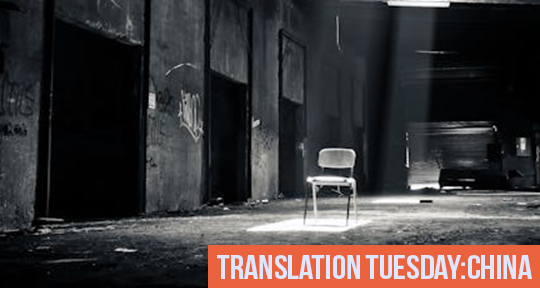If you’re unfamiliar with the work of Wen Yiduo, the renowned Chinese poet of the 1920s, these three poems demonstrate why he became a household name in his native country. The first, “Deadwater”, describes a backwater ditch, where the filth seamlessly transforms into images of ethereal beauty (“let the grease weave a layer of silk brocade / where germs brew a mist like twilit clouds at dusk”). In the second, “Silent Night”, the speaker’s comfortable domestic life can’t obscure the knowledge of suffering outside, piquing a deep indignation at the unfairness of the world. Finally, “End of Days” imagines the dull wait for death, consumed by loneliness and dread. All three are suffused with Wen’s trademark kaleidoscope of devout aestheticism, deeply intellectualized formalism, and raw patriotism.
While this selection of poems have been translated into English before, translator A. Z. Foreman‘s innovative adherence to a strict rhyme scheme draws out the poet’s original intention. Wen, a key figure in the “formalist school” of Republican China’s poets, didn’t care for much free verse and long rejected the idea that Chinese poetry should be in free verse at all. The basis of his poetic vision is not freedom but beauty, a beauty inspired by the English romantics and the formalist concept of “dancing in chains.”
Deadwater
This is a dead ditch rank with despair’s backwater.
A brisk wind can’t raise a ripple from its skin.
Why not junk some more scrap tin and copper here,
or dump your rotten dinner leftovers in.
Maybe the copper will turn to an emerald green,
and peach blossoms bloom out of the tin pots’ rust.
Then let the grease weave a layer of silk brocade
where germs brew a mist like twilit clouds at dusk.
Let the dead ditchwater ferment to green liquor
bubbling up floating pearls out of its white foam,
little pearls growing to bigger pearls in chuckles
that burst when liquor-raiding mosquitos come.
And so a dead ditch rank with despair’s backwater
can claim something lively, bright and all its own.
If the frogs here can’t handle the solitude
this stagnant muck can gurgle them up a tune!
This is a dead ditch rank with despair’s backwater.
No place for a Thing of Beauty in its juice.
Let’s just let Hellion Ugliness culture it
and see what kind of world it can produce.
Silent Night
This lamp and these four walls bright with its bleach,
this desk and chair like faithful friends in reach,
this paper fragrance of old books beside
my darling teacup white as a chaste bride,
my young son nursing at his mother’s breast,
my elder son whose snores announce good health and rest…
This eerie silent night. This rounded peace. These notes
of a thanksgiving song swell in my throat
but crack into a cursing diatribe.
No, silent night. I can’t, won’t take your bribe.
Who can enjoy a peace between four walls in here,
when his world reaches out to real frontiers?
These walls cannot block out the blast of war.
How can they halt my heart pounding? What for?
Better to choke my mouth with mud and sand
than croon the joy or grief of just one man.
Better lend mice my skull to burrow through
and feed this bag of flesh to maggots too,
if for a book of verse, a glass of wine and slight
comfort tick-tocking through a silent night
I fall deaf to my neighbors as they moan,
blind to those orphaned, widowed, shivering alone,
to men twitched dead in trenches, to madmen who chew
their beds, and all the horrors that life grinds us through.
Oh no, good fortune. I can’t take your bribe.
My world is not what these walls circumscribe.
Just hear the gunfire! Death is roaring, reaving.
Silent night, how could you keep my heart from heaving?
End of Days
Dew sobs in the choked waterpipes’ bamboo.
Green plantain tongues lick at the window like a bone.
As chalk-white walls around me back away
the room is now too huge for me to fill alone.
I light a firepit up in my heart’s chamber.
Waiting for my guest from afar, I hush and brood
feeding the flame with telltale turds of rats.
A mottled scaly snakeskin is my kindlewood.
The cock crows hurry. Ash heaps in the pit.
A cold dark wind glances my mouth in one soft blow
and there’s my visitor before my eyes.
I close my eyes at last to follow him and go.
Translated from the Chinese by A. Z. Foreman
Wen Yiduo was one of the most important modern poets of republican China and worked to pioneer a formal music in Modern Chinese, inspired both by classical Chinese prosody and by English models. Born in 1899 in Xishui, he sailed in 1922 to the United States, where he studied at the Chicago Art Institute and then Colorado College. His first collection of verse was published in 1923 in Shanghai while he was still overseas. He returned to China in 1925. His association with the China Democratic League lead to his assassination by the Kuomintang.
A. Z. Foreman is a literary translator, poet and language-acquisition addict currently working on a doctorate in Near Eastern Languages at the Ohio State University. His translations from Chinese have previously appeared in ANMLY, Metamorphoses and Rundelania. His translations from Arabic, Latin, Occitan, Ukrainian, Russian, Welsh, Yiddish and Irish have appeared in sundry places including Blue Unicorn, In Geveb, the Penguin Book of Russian Poetry, La Picioletta Barca, Brazen Head, Ilanot Review, the Barefoot Muse, Lunch Ticket and at least two people’s tattoos. He also writes his own poetry when things get weird or interesting enough. Most importantly, if you have a dog he’d love to pet it.
*****
Read more from the Asymptote blog:
- Translation Tuesday: “Katherine” by Ling Shuhua
- Translation Tuesday: An Excerpt from Yung Yung by Lo Yu
- Translation Tuesday: “Yongfen Zhang, Female, Central Plains” by Yiran Li

